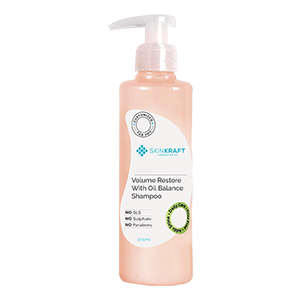Have you noticed thinner hair on your scalp off late? While there are a ton of reasons for hair loss, one reason could be your hormones playing up!
Hormones from thyroid gland can interfere with the growth of your hair. This post will cover the ABC of thyroid gland, it's associated hormones and related hair loss. Read on.
Highlights:
Does Thyroid Cause Hair Loss?
Understanding Thyroid
Thyroid [1] is an important gland in your body. Glands are groups of cells that synthesize the chemicals called hormones [2], which are released into your bloodstream. Thyroid is a butterfly-shaped gland situated at the lower front part of your neck.
The thyroid gland is important for metabolism, growth and development in the body. When thyroid glands make too much of the hormones, the condition is called hyperthyroidism [3] while the opposite (too less) is called hypothyroidism [4]. Important hormones produced by thyroid are thyroxine (T4) and triiodothyronine (T3) [5].
The Link Between Thyroid And Hair Loss
To get a clear picture of the relation between thyroid and hair loss, let us first understand the hair growth process.
- Hair starts growing from the roots (bottom of your hair follicles [6]) on your scalp.
- Scalp's blood vessels provide nutrients to the root and help in hair growth.
- Hair pushes up through your skin. The oil glands (sebaceous glands [7] in the skin) help maintain the required moisture in the hair.
- Hair grows for sometime and then falls off as a new hair growth cycle starts.
The hormones of the thyroid gland, T3 and T4, directly affect hair growth and its development. When the hormone production is disturbed, it can lead to hair thinning across your scalp.
Autoimmune conditions like alopecia [8] are often seen along with thyroid and lead to bald hair patches.
Conditions like PCOS (polycystic ovary syndrome) [9] that are related to thyroid can also lead to hair loss.
Antithyroid drugs like carbimazole [10] and propylthiouracil can also lead to hair loss in certain people.
Symptoms Of Thyroid Related Hair Loss
Slow and gradual thinning of hair is the most common symptom of thyroid related hair loss. It doesn't cause bald patches on the scalp. You may notice more than usual hair strands while combing or clogging up your shower. Hair loss related to thyroid is usually temporary.
It is normal to lose 50-100 strands of your hair on a daily basis. This happens because 5-10% of your hair is in the telogen phase [11] or resting phase on any given day. Hair loss beyond this needs medical attention and may be related to thyroid. Get yourself evaluated for thyroid hormone levels.
Common symptoms of hypothyroidism include:
- Weight gain
- Fatigue
- Constipation
- Mood swings
- Feeling cold
- Forgetfulness
Common symptoms of hyperthyroidism include:
- Anxiety
- Sleeping disorders
- Brittle hair
- Weight loss
- Increased sweating
- Fatigue
- Fast heartbeat
How To Stop Thyroid Related Hair Loss?
1. Medical Treatment Options
This involves working with your doctor to keep your thyroid under control.
Common medications include:
- Levothyroxine [12]
- Propylthiouracil and methimazole
- Beta blockers
A. Surgery
Surgery is another treatment option for thyroid disorders. It involves the removal of some or all of the thyroid.
B. Radiation Therapy
Radiation therapy removes some cells in the thyroid gland, thereby decreasing the amount of hormones that the gland makes. It induces hypothyroidism, which is then managed using hormone replacement therapy.
Note:
The new hair that grows back after the treatment may vary in color and texture from your natural hair.
2. Home Remedies
While the home remedies listed below do not hold any scientific evidence, you can give them a try to boost hair growth.
Address Nutritional Deficiencies
Nutritional deficiencies are linked to hair loss. The following are crucial for hair growth:
- Vitamin B7 and B complex
- Copper
- Zinc
- Vitamin C, A and E
- Coenzyme Q10
Talk to your doctor if you can turn to a multivitamin supplement.
A. Iron Rich Foods
Iron deficiency and thyroid related hair loss are related. You can get tested for iron levels in your body and consider supplements for iron-rich foods like liver, beef, eggs, lamb, green leafy vegetables and so on.
B. Stay Away From Inflammatory Foods
Avoid inflammation-causing foods like processed foods, fried foods, red meat and sugars. This can aggravate your thyroid. Have anti-inflammatory foods like turmeric and ginger. Eat a diet rich in whole foods.
C. Include Herbs
Herbs like palmetto, red clover, false unicorn, chasteberry and dong quai are known to treat hair loss. Talk to your doctor before you start using them.
D. Apply Essential Oils
Essential oils like eucalyptus oil and other plant extracts are known to improve hair growth. Consider a patch test before you start using essential oils for hair growth.
E. Control Iodine Consumption
Iodine is associated with thyroid. Keep a watch on your iodine intake by understanding how much iodine you would require in a day.
Wrapping Up
The symptoms of thyroid related hair loss usually subside once hyperthyroidism or hypothyroidism are treated. The treatment options include medications, surgery and radiation therapy. Follow a good diet to address the nutritional deficiencies linked to hair loss.
1. https://www.ncbi.nlm.nih.gov/books/NBK28/
2. https://medlineplus.gov/hormones.html
3. https://www.ncbi.nlm.nih.gov/pmc/articles/PMC5014602/
4. https://www.niddk.nih.gov/health-information/endocrine-diseases/hypothyroidism
5. https://www.ncbi.nlm.nih.gov/books/NBK499850/
6. https://www.ncbi.nlm.nih.gov/books/NBK470321/
7. https://www.ncbi.nlm.nih.gov/books/NBK499819/
8. https://www.ncbi.nlm.nih.gov/pmc/articles/PMC5573125/
9. https://www.ncbi.nlm.nih.gov/pmc/articles/PMC3737989/
10. https://pubchem.ncbi.nlm.nih.gov/compound/Carbimazole
Recommended Products
Was this Article helpful?
- Least helpful
- Most helpful











